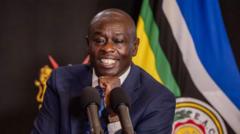Kenya's parliament is in the throes of a high-stakes political drama as it embarks on the impeachment trial of Deputy President Rigathi Gachagua, who is facing 11 charges including corruption and inciting ethnic divisions, which he denies. Following a decisive vote by the National Assembly, the Senate has begun the two-day trial that will determine his political fate. The charges stem from a rift with President William Ruto and claims of acquiring assets worth $40 million through corrupt means. As the trial advances, analysts predict an uphill battle for Gachagua, with the Senate's ruling party likely to align with the opposition as it did in the Assembly vote. The trial is expected to progress into detailed examination of evidence from both the Assembly and Gachagua’s defense. Should the impeachment succeed, the deputy president, a wealthy businessman from Kenya's central region, would be banned from future public office. In anticipation, he has attempted, unsuccessfully, to block proceedings through numerous court filings, and would likely challenge an unfavorable outcome legally. Beyond the courtroom, the trial has captivated public attention, overshadowing pressing national issues, notably the economic challenges that incited protests in June against tax hikes, revealing deeper fractures in the nation's political fabric.
Kenya's Political Waters Rocked by Deputy President's Impeachment Trial

Kenya's Political Waters Rocked by Deputy President's Impeachment Trial
The senate starts deliberations on charges against Deputy President Gachagua amid political unrest and economic woes.
Kenya's Deputy President Rigathi Gachagua faces an impeachment trial with the Senate deciding on charges related to corruption and undermining the government. The trial follows a fallout with President William Ruto and takes place amid broader political and economic tension in the nation.


















